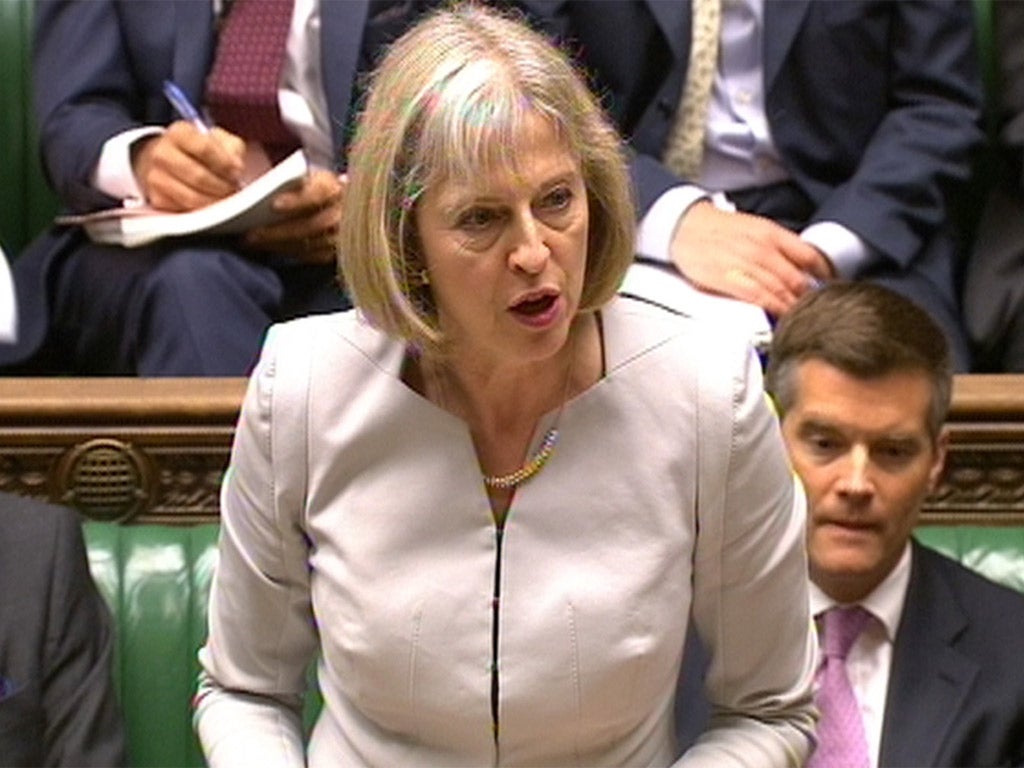Tory backbenchers in revolt as Theresa May backs down over European arrest warrants
Home Secretary seeks to retain 35 EU criminal justice measures

The Home Secretary, Theresa May, has been forced to back down and agree that Britain should remain a participant in the controversial European arrest warrant scheme.
To shouts of “shame” from her own benches, Ms May said Britain would continue to be part of the system but that British law would be amended to “rectify problems and increase protections” for people wanted for extradition. Under the terms of the Lisbon Treaty, Britain has the option of leaving 133 pan-European home affairs measures but must make a decision on whether to opt out by next year. Ms May was under strong pressure from some Tory backbenchers to pull out of all the measures – including the European Arrest Warrant and Britain’s membership of Europol.
But after negotiations with the Liberal Democrats, Ms May confirmed that the fast-track arrest warrant was among 35 EU criminal justice measures the Government would seek to retain. MPs will be given a vote on the new deal next week. Dozens of Conservatives are expected to oppose it.
In a statement to MPs, Ms May insisted that new safeguards would be put in place to ensure traditional British liberties were protected while allowing continued cross-border co-operation by law enforcement authorities.
“For reasons of policy, principle and pragmatism, I believe that it is in the national interest to exercise the United Kingdom’s opt-out and rejoin a much smaller set of measures which help us to co-operate with our European neighbours in the fight against serious and organised crime,” she said.
“We must strike the right balance between supporting law enforcement and protecting our traditional liberties. What I have outlined today will achieve both of those goals.”
She said she would amend the Anti-Social Behaviour Crime and Policing Bill to ensure that an arrest warrant could be refused for minor crimes. She will also amend the existing Extradition Act so a suspect in the UK can only be transferred once a decision has been made to charge and try them.
This is an effort to prevent further cases like Andrew Symeou, who spent 10 months in pre-trial detention in Greece and a further nine months on bail only to be acquitted. She said she wanted to see the greater use of arrangements which allow suspects to be questioned in the UK by overseas investigators through video conferencing and more sharing of information between police and prosecutors at the investigative stage before a warrant is sought.
But there was a furious response from some Tory Eurosceptics who remain deeply opposed to the European arrest warrant.
Bill Cash, who chairs the Commons European Scrutiny Committee, accused Ms May of planning to hold a Commons vote before MPs have had a chance to study in detail the EU powers she proposes to retain.“We have been given neither the proper time nor the opportunity to consider these matters,” he said. Tory backbencher Jacob Rees-Mogg added Ms May was surrendering powers to Brussels in breach of assurances in the Coalition Agreement.
Peter Bone, the Tory MP for Wellingborough, said: “It appears that the executive is bouncing Parliament.” Labour also criticised Ms May with the shadow Home Secretary, Yvette Cooper, accusing her of seeking to burnish her Eurosceptic credentials at the expense of international law enforcement co-operation.
Crime fighting: EU co-operation
Europol
The EU-wide crime fighting organisation was set up to tackle large-scale criminal and terrorist networks that posed a significant threat to the “internal security” of the EU and its citizens. Its focus has been on terrorism, international drug trafficking, money laundering and organised fraud.
The organisation, which like Interpol practises enhanced co-operation between police forces, has been described as “resilient in the face of traditional law enforcement”.
European Arrest Warrant
While critics have said the warrant has led to the unfair trails of Britons abroad, including that of Andrew Symeou who was held in a Greek prison for four years before being released. It was used successfully to return the teacher Jeremy Forrest to Britain after he abducted a 15-year-old girl in France last September.
Join our commenting forum
Join thought-provoking conversations, follow other Independent readers and see their replies
Comments
Bookmark popover
Removed from bookmarks